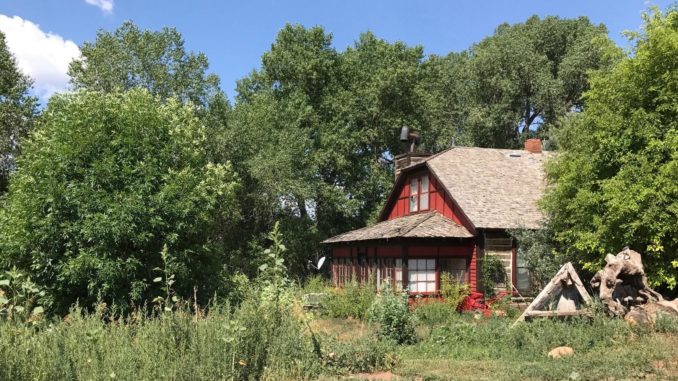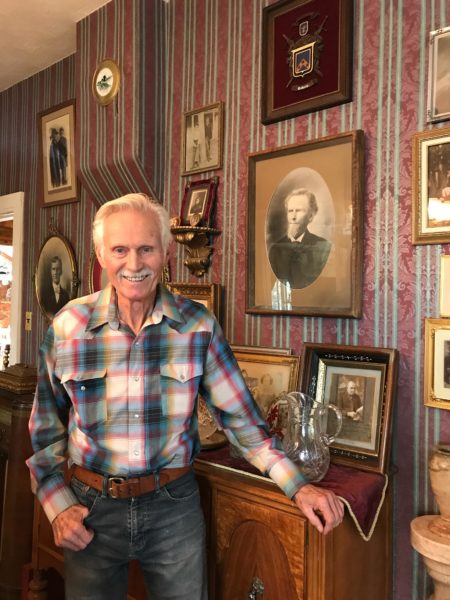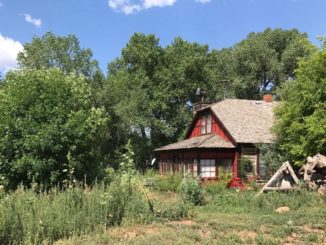
by Libby James
North Forty News
The ultimate fate of the historic Roberts Ranch that spans 17,000 acres from Owl Canyon to Virginia Dale in northern Colorado is still in question, and as yet there is no definite timeline for resolution of this sensitive issue, according to Fort Collins attorney Nancy Wallace.
Now in the estate of Catherine Roberts, second wife of Evan Roberts, the vast property is currently under a Nature Conservancy easement, which guarantees that it will remain agricultural. No one will ever be able to subdivide it. The ranch can only be sold as a single entity.
Disposition of the property is currently in probate, and litigation has been underway for well over a year. A process of negotiation continues.

D.L. Roberts, 84-year-old son of Evan Roberts, is living in a historic homestead on the property with one of his sons. He has a life estate in the house and the acreage around it, but at his death, that will end, and his sons will no longer be able to live in the house or have access to the land.
As the personal representative that Catherine appointed before her death in 2015, Wallace has been doing all she can to act in accordance with Catherine’s will and her wishes. They include donation of the ranch to charity in the form of creating a charitable trust. “The solution to the issue is to have the court place the property into a charitable trust similar to the McGregor Ranch in Estes Park,” Wallace said. The Roberts family would not be in charge of managing the trust.
Wallace says that the ranch will not be a big money-maker. “While the Roberts Cattle Company will continue to function, profits will not go to Roberts family members but rather to the trust,” Wallace said.
To date, Wallace has sold or donated Catherine’s personal property and household goods to the Livermore Community Center.
While D.L. says that Evan Roberts expressed a dying wish to preserve the land as whole and agricultural, to be inherited by D.L’s sons, Ben and Burke, at the death of Evan’s wife Catherine, this information is not part of a formal will and therefore cannot be affirmed. In her will, Catherine asked that the property go to charity rather than D.L.’s sons. The Roberts took the issue to court but lost in their attempt to keep the ranch in the family.
Wallace says that following a serious fall in 2012, Catherine became “more deliberate” in her wishes as she took up residence in an assisted living facility in Fort Collins. She was unhappy that she was never able to return to her home on the ranch. Wallace explained that giving her the care she needed in such a remote location was not possible.
D.L. explains that his once-congenial relationship with his stepmother deteriorated after her fall. “She was never the same again,” he said. For years, he had been a regular visitor at her home on the ranch. He saw her less frequently during the last years of her life.
The disposition of this vast, beautiful and historic piece of land has become a contentious, painful issue for everyone involved. D.L Roberts is distraught to think that his family’s land will likely no longer belong to anyone in the Roberts family. Old friends and neighbors have been quick to sympathize with his likely loss.
Wallace also understands the painful nature of the conflict that has developed. “You can’t re-live history,” she says. “I can see that in some ways D.L. is historically correct.”
The controversy over the future of the Roberts ranch is not unique in the western United States. When it is time for land to pass from one generation to another, estate taxes have become so prohibitive that owners seek ways to avoid or reduce them. Their efforts often include seeking conservation easements or trusts.
There are times when family disagreements or misunderstandings lead to long, drawn-out conflict. Often, siblings due to inherit land are in differing situations or have differing outlooks that cause conflict among them.
Land ownership is an ancient right, but it may be fair to wonder if any of us humans can actually “own” a part of the earth. Sadly, it is one of the things many of us fight over.
Support Northern Colorado Journalism
Show your support for North Forty News by helping us produce more content. It's a kind and simple gesture that will help us continue to bring more content to you.
BONUS - Donors get a link in their receipt to sign up for our once-per-week instant text messaging alert. Get your e-copy of North Forty News the moment it is released!
Click to Donate


